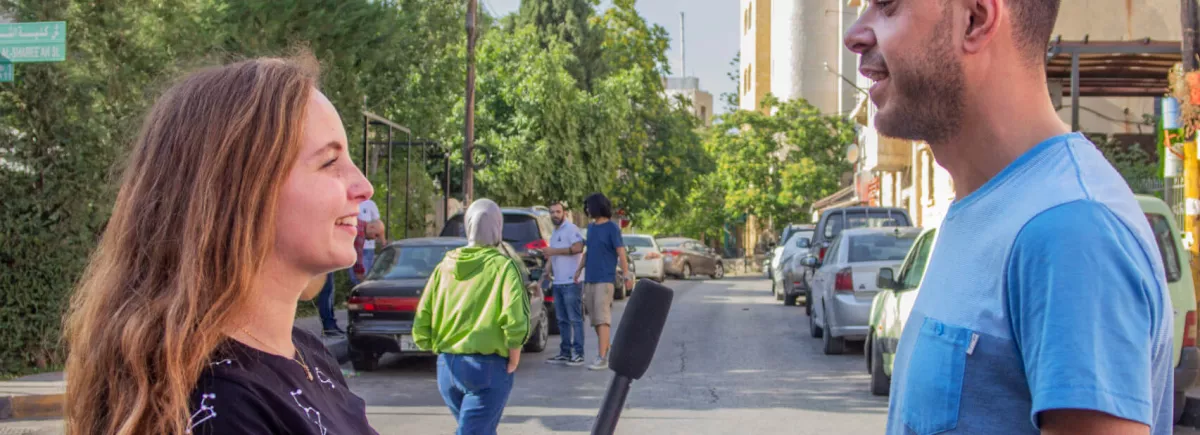
A Space for Dialogue in the Middle East: The Story of Qarib Talks
Related project
QaribHow do you engage a broader community of journalists in meaningful discussions about issues that are timeless and relevant? How do you generate genuine interest in joining public debates that cross national, political, and professional boundaries?
These were some of the questions that inspired the creation of the QaribTalks — a series designed not to deliver answers, but to facilitate open discussion. Qarib is a CFI programme funded by the Agence Française de Développement (AFD), aiming to support social cohesion and dialogue in Jordan, Palestine, Lebanon, and Iraq through media support.
Since its launch in 2022, the programme team has organised fifteen QaribTalks, providing a platform for journalists, researchers, and citizens from across the Middle East to discuss the region’s most pressing social and political challenges. More than a lecture series, it has become a regional conversation, reaching over 3.2 million people; more than 15,000 viewers have joined via Facebook and Zoom, generating 12,600 engagements. Notably, half of all viewers are women, reflecting the programme’s commitment to inclusivity.
A platform for dialogue beyond headlines
Qarib Talks was born from the belief that independent media need more than technical capacity — they need spaces to think, question, and connect. The initiative aimed to encourage open debate on issues of shared regional concern, particularly those affecting journalists and citizens directly, while enriching these discussions with insights from non-media experts such as political analysts, researchers, and human rights advocates.
Each talk moves beyond the news cycle to explore how journalism can respond to the political, economic, and social transformations reshaping the Arab region. The result is a meeting point between media, governance, and civic life — a place where regional voices can freely and critically engage with one another. At the same time, the themes and insights emerging from these discussions feed directly into the strategic direction of the Qarib program itself. Qarib’s core mission is to strengthen independent journalism by supporting media production through funding, consultancy, advisory services, and training.
This approach ensures that local outlets can provide timely, in-depth, and relevant coverage that reflects the realities of their societies. Since its launch, Qarib has supported the production of over 12,000 stories by more than 40 partner media outlets across the region — content that continues to inform, engage, and inspire millions of citizens.
From Ukraine to the Middle East
From its beginnings, the Qarib Talks has evolved into a cross-border dialogue platform. Its themes reflect the region’s challenges and resilience, including media coverage of femicide and domestic violence; local elections and citizen participation in Jordan, Lebanon, and Palestine; narratives around drug use and trafficking; violations of press-freedom and attacks on journalists; the role of Syrian media in transitional justice; women’s rights and independent journalism; and the editorial challenges of covering the war in Gaza.
The series began in March 2022 with the talk War in Ukraine – Causes, Context, and Impact on the Middle East. Although Ukraine may seem far away, the consequences of the Russian invasion were immediately felt across the Arab world in the form of rising oil prices, currency inflation, and the disappearance of Ukrainian wheat from Lebanese bakeries revealing how global crises have an impact on regional realities. There were also interrogations regarding perceived inconsistencies and Western double standards towards the Middle East and Ukraine, which had been raised well before the 7th of October 2022 and the atrocities that unfolded.
As in other talks, the objective was to invite experts from the relevant sector who could provide in-depth knowledge and insights. This session featured Dr Oleksandr Bohomolov, Director of the National Institute for Strategic Studies in Ukraine, and Dr Hanna Shelest, Director of Security Programmes at the Council for Foreign Policy, “Ukrainian Prism.” Together, they shared their insights and perspectives from the narratives surrounding the war in Ukraine.
Each conversation arises from an urgent public debate or moment of crisis. Rather than providing closure, Qarib Talks creates an environment for critical reflection, enabling participants and audiences to share perspectives, challenge assumptions, and explore potential solutions together.
Two Years Since October 7: Revisiting the Regional Order
The most recent edition, Qarib Talk#15, which took place on 3 October 2025, marked two years since October 7. Under the title Gaza and the Shifting Regional Order, the discussion examined how the atrocities in Gaza and the war in South Lebanon intertwine with regional power dynamics. Moderated by Nada Abdelsamad, the Chief Editorial Advisor of the Qarib programme, the discussion featured Joe Macaron, a regional analyst specializing in Lebanese and Iranian affairs; Saman Noha, the Editor-in-Chief of NIRIJ in Iraq; Mustafa Ibrahim, an expert on Palestinian affairs; and Raghad Salameh, a Palestinian journalist.
The speakers discussed Iranian influence, regional rivalries, and the humanitarian and financial constraints facing Palestinians. They also addressed Western media bias, emphasising the vital role of independent Arab media in documenting crises, resisting censorship, and shaping public understanding.
A Space for Connection and Understanding
From the war in Ukraine to the changing situation in Gaza, Qarib Talks has remained true to the spirit of the Qarib programme, which is to strengthen independent media, promote ethical journalism and foster dialogue that transcends borders. It offers a reminder that informed conversation, rooted in empathy, openness, and critical thinking, is vital in countering polarisation and rebuilding public trust.


